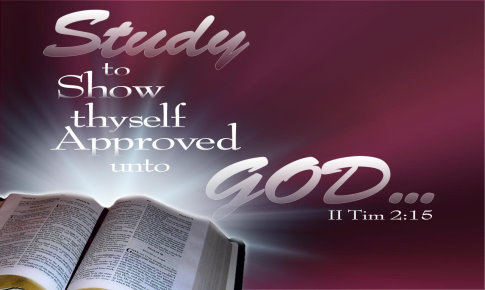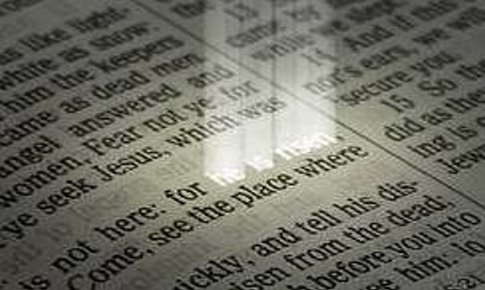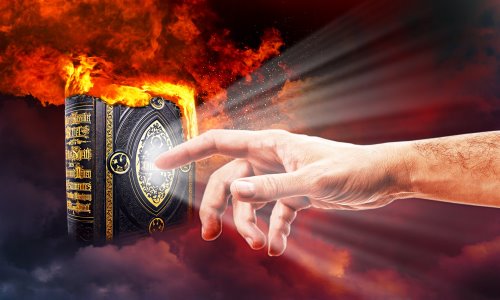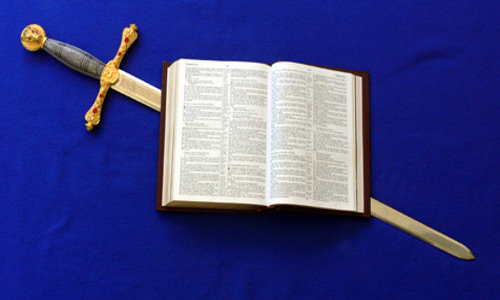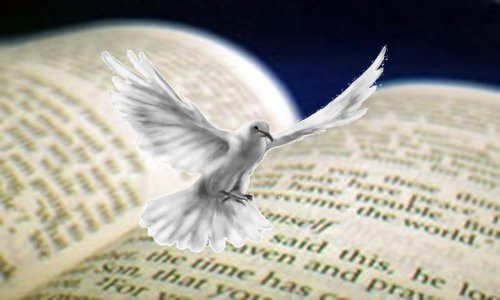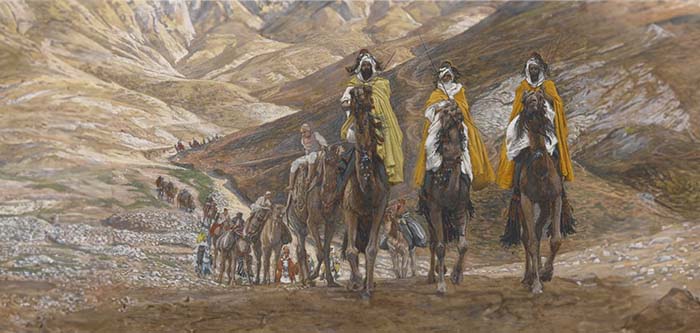
Was Our Lord Born On December 25th Or Even In The Month Of December?
The main arguments against the Nativity having taken place in December may be set forth very simply:
1. The extreme improbability, amounting almost to impossibility, that Mary, under such circumstances, could have undertaken a journey of about 70 miles (as the crow flies) through a hill district averaging some 3,000 feet above sea level, in the depth of winter:
2. Shepherds and their flocks would not be found "abiding" (Gr. agrauleo) in the open fields at night in December (Tebeth) for the paramount reason that there would be no pasturage at that time. It was the custom then (as now) to withdraw the flocks during the month of Marchesvan (Oct.-Nov.) from the open districts and house them for the winter.
3. The Roman authorities in imposing such a "census-taking" for the hated and unpopular "foreign" tax would not have enforced the imperial decree (Luke 2:1) at the most inconvenient and inclement season of the year by compelling the people to enroll themselves at their respective "cities" in December. In such a case, they would naturally choose the "line of least resistance" and select a time of year that would cause the least friction and interference with the habits and pursuits of the Jewish people. This would be in the autumn when the agricultural round of the year was complete, and the people were generally more or less at liberty to take advantage, as we know many did, of the opportunity of "going up" to Jerusalem for the "Feast of Tabernacles" (John 7:8-10, &c), the crowning Feast of the Jewish year.
To take advantage of such a time would be, to the Romans, the simplest and most natural policy, whereas to attempt to enforce the Edict of Registration for the purpose of Imperial taxation in the depth of winter when traveling for such a purpose would have been deeply resented, and perhaps have brought about a revolt, would never have been attempted by such an astute ruler as Augustus.
What Did Happen On December 25th? The Answer: A Promised Miracle!
There is considerable evidence that, without the shadow of a doubt, the day assigned the Birth of the Lord, viz. December 25th was the day on which He was "begotten of the Holy Ghost," i.e., by pneuma hagion = Holy Spirit (Matt. 1:18), and His birth took place on the Hebrew 15th of Ethanim, our September 29, in the year following, thus making beautifully clear the meaning of John 1:14, "The Word became flesh" (Matt. 1:18-20) on the 1st Tebeth or December 25th (5 B.C.), "and tabernacled (Gr. eskeno-sen) with us", on 15th of Ethanim or September 29 (4 B.C.).
In both the Hebrew and the Western calendars, from Tebeth 1st to Ethanim 15th = 280 days, and December 25 to September 29 = 280 days. The 280 days = 40 weeks or forty sevens, the perfect period of human gestation (7 x 5 x 8 = 280). The Component
Numbers of 280 are highly significant in this connection.
7 denotes Spiritual Perfection.
5 denotes Divine Grace.
8 denotes Resurrection, Regeneration.
The 15th of Ethanim (or Tisri) was the first day of the Feast of Tabernacles. The circumcision, therefore, took place on the eighth day of the Feast = 22nd Ethanim = October 6-7 (Lev. 23:33-34). These two momentous events fall into their proper place and order, and the real reason is made clear why the 25th of December is associated with our Lord and was set apart by the Apostolic Church to commemorate the stupendous event of the "Word becoming flesh" - and not, as we have for so long been led to suppose, the commemoration of a pagan festival.
An overwhelmingly strong argument in favor of the correctness of this view lies in the fact that the date of "The Festival of Michael and All Angels" has been from very early times, the 29th day of September, on Gentile (Western) reckoning.
But "The Church" even then had lost sight of the reason why this date, rather than any other in the Calendar, should be so indissolubly associated with the great Angelic Festival.
The following expresses the almost universal knowledge or rather want of knowledge of "Christendom" on the subject: "We pass on now to consider, in the third place, the commemoration of September 29, the festival of Michaelmas, par excellence. It does not appear at all certain what was the original special idea of the commemoration of this day" (Smith's Dict. of Chr. Antiqq. (1893), Vol. ii, p. 1177 (3) ).
A reference, however, to the Table and statements above makes the "original special idea" of why the Festival of "Michael and All Angels" is held on September 29 abundantly clear. Our Lord was born on that day, the first day of the "Feast of Tabernacles" (Lev. 23:39). This was on the fifteenth day of the seventh Jewish month called Tisri, or Ethanim, corresponding to our September 29 (of the year 4 B.C.)
The "Begetting" (Genesis) Day of the Lord was announced by the Angel Gabriel (Luke 1:19).
The "Birth" Day, by "(the) Angel of the Lord," is unnamed in either Matthew or Luke.
That this Angelic Being was "Michael the Archangel (of Jude 9), and Mika'el hassar haggadol - "Michael the Great Prince"- of Dan. 12:1 seems clear for the following reason: If, "when again (yet future) He bringeth the First-begotten into the world, He saith, Let all the Angels of God worship Him" (Heb 1:6; quoting Psa. 97:6) - then this must include the great Archangel Michael himself. By parity of reasoning, on the First "bringing" into the world of the only begotten Son, the Archangel must have been present. And the tremendous announcement to the shepherds, that the Prince of Peace (Isa. 9:6) was on earth in the person of the Babe of Bethlehem must therefore have been made by the same head of the heavenly host (Luke 2:9-14). In mundane affairs, announcements of supremest importance (of kings, etc.) are invariably conveyed through the most exalted personage in the realm. The point need not be belabored.
The fact of the Birth of our Lord having been revealed to the shepherds by the Archangel Michael on the 15th of Tisri (or Ethanim), corresponding to September 29, 4 B.C. - the first day of the Feast of Tabernacles - must have been known to believers in the Apostolic Age. But "the mystery of iniquity" which was "already working" in Paul's day (2 Thess. 2:7), quickly enshrouded this and the other great fact of the day of the Lord's "begetting" on the first day of the Jewish month Tebeth (corresponding to December 25, 5 B.C.) - as well as other events connected with His sojourn on earth, - in a rising mist of obscurity in which they have ever since been lost.
The earliest allusion to December 25 (modern reckoning) as the date for the Nativity is found in the Stromata of Clement of Alexandria, about the beginning of the third century A.D.
That "Christmas" was a pagan festival long before the time of our Lord is beyond doubt. In Egypt, Horus (or Harpocrates, the son of Isis (Queen of Heaven), was born about the time of winter solstice. By the time of the early part of the fourth century A.D., the real reason for observing Christmas as the date for the miraculous "begetting" of Matt. 1:18 and "the Word becoming flesh" of John 1:14 had been lost from sight. The policy of Constantine and his Edict of Milan, by establishing universal freedom of religion, furthered this.
When many of the followers of the old pagan systems - the vast majority of the empire, it must be remembered - adopted the Christian religion as a cult, which Constantine had made fashionable, and the "Church" became the Church of the Roman Empire, they brought in with them, among a number of other things emanating from Egypt and Babylon, the various Festival Days of the old "religions." Thus, "Christmas Day, " the birthday of the Egyptian Horus (Osiris), became gradually substituted for the real Natalis Domini of our blessed Savior, viz. September 29, or Michaelmas Day.
If, however, we realize that the center of gravity, so to speak, of what we call the Incarnation be the Incarnation itself- the wondrous fact of the Divine "begetting" when "the Word became flesh" - and that this is to be associated with December 25th, instead of March - as for 1,600 years Christendom has been led to believe - then, "Christmas" will be seen in quite another light and many who have hitherto been troubled with scruples concerning the day being, as they have been taught, the anniversary of a Pagan festival will be enabled to worship on that Day without alloy of doubt, as the time when the stupendous miracle, which is the foundation stone of the Christian faith, came to pass.
The "Annunciation" by the Angel Gabriel marked the genesis of Matt. 1:18, and the first words of John 1:14. The announcement to the shepherds by the Archangel Michael marked the Birth of our Lord. John 1:14 is read as though "the Word became flesh (R.V.) and dwelt among us "were one and the same thing, whereas they are two clauses.
The paragraph should read thus:
"And the Word became flesh; (Gr. ho logos sarz egeneto)
And tabernacled with (or among) us." (Gr. kai eskenosen en hemin).
The word tabernacled here (preserved in R.V. marg.) receives beautiful significance from the knowledge that "the Lord of Glory" was "found in fashion as a man" and thus tabernacled in human flesh. In turn, it shows in equally beautiful significance that our Lord was born on the first day of the great Jewish Feast of Tabernacles, viz. the 15th of Tisri, corresponding to September 29, 4 B.C. (modern reckoning).
The Circumcision of our Lord took place, therefore, on the eighth day, the last day of the Feast, the "Great Day of the Feast" of John 7.37
("Tabernacles" had eight days. The Feast of Unleavened Bread had seven days, and Pentecost had one. See Lev. 23)
But What About The "Wise Men"
The Gospel of Matthew records that the "Magi" or "Wise Men" came from the East to see Jesus after he was born. The Greek word magos, correctly translated as "Magi" (Matt. 2:1 - NIV), is a plural proper noun referring to people of a specific religious group that existed in the Ancient Near East, most specifically the area of ancient Media and Persia. By the time of Christ, that area was the country of Parthia, which is north and east of Israel. Much has been written in encyclopedias and Bible dictionaries about their origin, history, and beliefs, so that need not be repeated here; however, it is important to know that at least some Magi were looking for a Messiah who would conquer darkness and restore justice in the world.
Perhaps the most important reason to refer to these men by the proper name, Magi, is so the reader of the Bible can see their relation to the religious group that was at one time led and instructed by Daniel the prophet. Sometime around 600 B.C., Daniel was made ruler over the Magi, although the connection is not as clear as it could be because, in the Book of Daniel, the Magi are referred to as "magicians" and Daniel is referred to as "chief of the magicians" (Dan. 4:9; Dan. 5:11). Although there is no proof for it outside the Bible, it seems certain that Daniel instructed the leaders of the Magi about the Jewish origin of the true Messiah because hundreds of years later some Magi made a long and dangerous trip to Israel to pay homage to the child Jesus Christ (Matt. 2:2).
As the centuries passed after the birth of Christ, the true knowledge about the Magi was replaced by superstition and tradition, and this has persisted in spite of the fact that it contradicts what is clearly written in Scripture. For example, the Magi did not follow a star to Bethlehem. No super-bright, westward traveling celestial phenomena appeared in the sky and went from Parthia to Bethlehem. The fact that only the Magi showed up was because the "star" itself was not unusual but was a unique occurrence of planetary conjunctions and appearances that, viewed by themselves and considered individually, would not seem unusual at all.
These Magi were astronomers, and the "star" they saw was a series of celestial events, including stars, planets, and conjunctions, especially involving the “King Planet” Jupiter. Ancient astronomers tracked the timing and position of the stars by when they were first visible over the horizon. We know the Magi used this technique because it was a usual procedure, and also by what they said when they reached Jerusalem: "… for we have seen his star in the east, and are come to worship him" (Matt. 2:2). The Magi were watching the stars and noting their relation to points on the horizon, to each other, and to the constellations in which they appeared. Eventually, they saw patterns that convinced them the Messiah had been born.
The Magi saw celestial events that led them to conclude that the Jewish Messiah had been born. Therefore, they made a logical decision and went to Jerusalem, the religious and political capital of Israel, and asked the king where to find this new Messiah. Matthew 2:1 makes it clear they came to “Jerusalem," not to Bethlehem. There, King Herod inquired from the priest and scribes where Christ should be born (Mat. 2:4-6). Herod then enquired when the Magi had seen His Star (Mat. 2:7) and sent them to Bethlehem (Mat. 2:8).
We do not know whether the Magi traveled to Jerusalem by themselves or joined a trading caravan that was heading in that direction. Neither do we know how long the journey took, but it would have taken at least a month and maybe several (Parthia itself is hundreds of miles across, and we do not know exactly where they started their journey). Furthermore, the Bible does not say how many Magi came to see Jesus. Tradition says three, but that idea comes from the three kinds of gifts: gold, frankincense, and myrrh. These gifts were all fitting for a king, and each could easily be sold or bartered to purchase necessities, so they would greatly help Joseph and his new family. It is not likely that each of the Magi individually brought "a gift," like we would bring “a gift" to a birthday party. The three gifts would have been presented as a collective offering from the Magi who made the journey and the people they represented back in Parthia, who collected the gift.
There were almost certainly many more than three Magi who made the trip. For one thing, the purpose of the trip was to pay homage to the long-awaited Messiah, and many devout people would want to be part of that event. Furthermore, the trip was long and dangerous, and it was standard procedure in those days to travel with a large number of people for protection, especially when traveling with valuables, and more especially when those valuables were to be taken across an international border into an enemy empire (at the time, Rome and Parthia were enemies).
Another good reason for believing that there were more than three Magi is that when they arrived in Jerusalem, King Herod and "all Jerusalem" were disturbed by their coming (Matt. 2:3). When the Magi arrived in Jerusalem, neither they nor King Herod knew where to find the young Messiah. However, Micah 5:2 foretold that the Messiah would be born in Bethlehem, so that is where King Herod sent them (Matt. 2:4-8). Bethlehem is seven miles south of Jerusalem, and the Magi did not travel there the day they got an audience with King Herod. Even at two miles per hour, the journey would have only taken three and a half hours, and we can conclude from the biblical record that they returned to where they were staying and prepared to make the journey the next day. It was usual for caravans to get started very early in the morning while it was still dark, and this one was no different.
Based on Scripture and the timeline, we know that the Magi came when Jesus was about a year and a half old. Matthew 2:11 says "young child" (Gr. paidion), not "newborn" (Gr. brephos). What they found was a toddler, which explains why the terrible King Herod killed all the children two years old and under (Matt. 2:16-18).
When the Magi headed out for Bethlehem in the early morning while it was still dark, the "star" they had observed back in Parthia "went before them" (Matt. 2:9). As we already pointed out, they did not follow the star to Bethlehem, they were already going there. The star that seemed to go in front of them was the planet Jupiter, which at that time was in the southern sky. As it rose in the sky, it became more and more directly south, the very direction they were heading, and thus appeared to be "going before them." Finally, as it reached its zenith (high point) in the sky south of them, it "stood" directly over Bethlehem, which was also south of them (by the way, astronomers still use the same language today, saying stars "rise," "stand," and "set").
Seeing Jupiter going before them caused great joy among the group. Although they certainly would have known Jupiter was visible in the sky, they did not know where the Messiah or Bethlehem was, and thus would not have known the "star" would also seem to go before them. To the untrained eye, there was nothing in the sky that morning that would have been a cause for rejoicing.
Upon finding the "child" (Jesus was not a "baby" anymore; Matt. 2:11), the Magi paid homage to him and presented their gifts. The Magi were not stupid, and Herod had a reputation for killing potential rivals, so they asked God for guidance as to what to do after they found the Messiah. This fact is not clearly stated in most English Bibles, but the Greek word translated "warned" (Gr. chrēmatizō) is used of an oracle or divine instruction or warning that came to people who asked for guidance. The Magi asked God what to do, and He warned them not to go back to Herod, so they went home by another route (Matt. 2:12).
Likely, right after the Magi left, Joseph was also warned by God to flee the area, which he did, going down to Egypt (Matt. 2:13-14). This is another piece of evidence that shows the Magi were not present at the birth of Jesus but long after. Herod and the powers in Jerusalem had ignored the shepherds, and after the birth of Jesus, Joseph, and Mary stayed in the area and completed the forty days of cleansing and the sacrifice required by the Law of Moses (Luke 2:22-24; Lev. 12:1-8). However, after the Magi left Judea, Herod was furious and would have moved very quickly to do away with this new potential rival for his throne. There is no way that Joseph and Mary could have stayed around for forty days without Herod finding and killing both them and Jesus. This accounts for the urgency in the angel's message to Joseph: "…Get up…take the child and…escape to Egypt…." "Take" and "escape" are in the imperative mood; they are firm commands, and Joseph acted on them immediately (Matt. 2:13).
In conclusion, we should ask ourselves why it is important to know the truth about the Magi. What difference does it make whether they were Magi, wise men, or kings? Who cares whether there were three of them or fifty? What is wrong with thinking they just followed a celestial object southwest from Parthia to Bethlehem? The answer relates to God's purpose for giving us His Word, which is His instruction for our lives, full of valuable lessons. The Bible is not made up of fanciful stories but of credible historical records. There is very little to learn from a story of three men in Parthia seeing an unusual "star" and just following it, and no way to discern how they were supposed to know that this "star" was leading them to the Messiah, so they should bring gifts.
The Heavens Declare The Glory Of God





